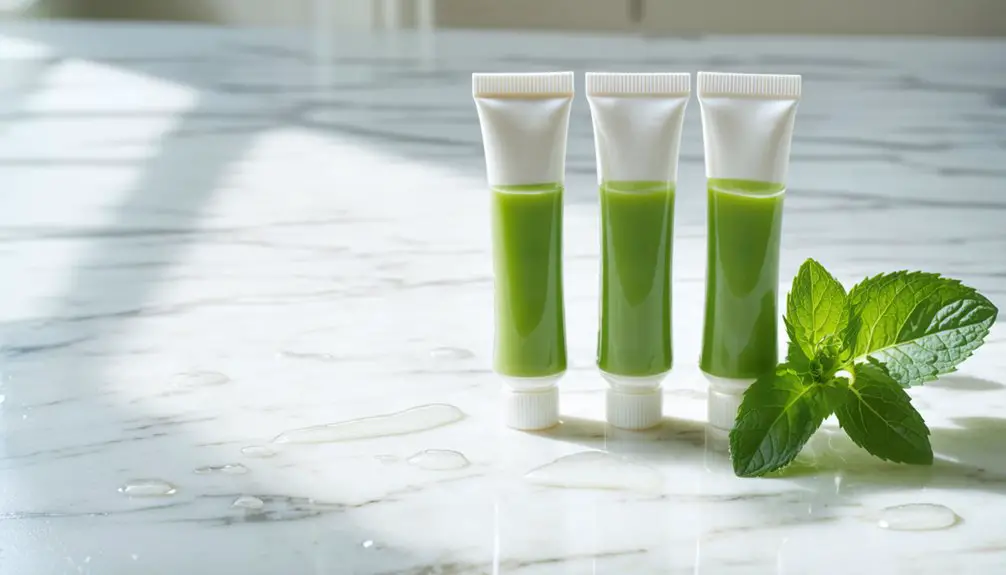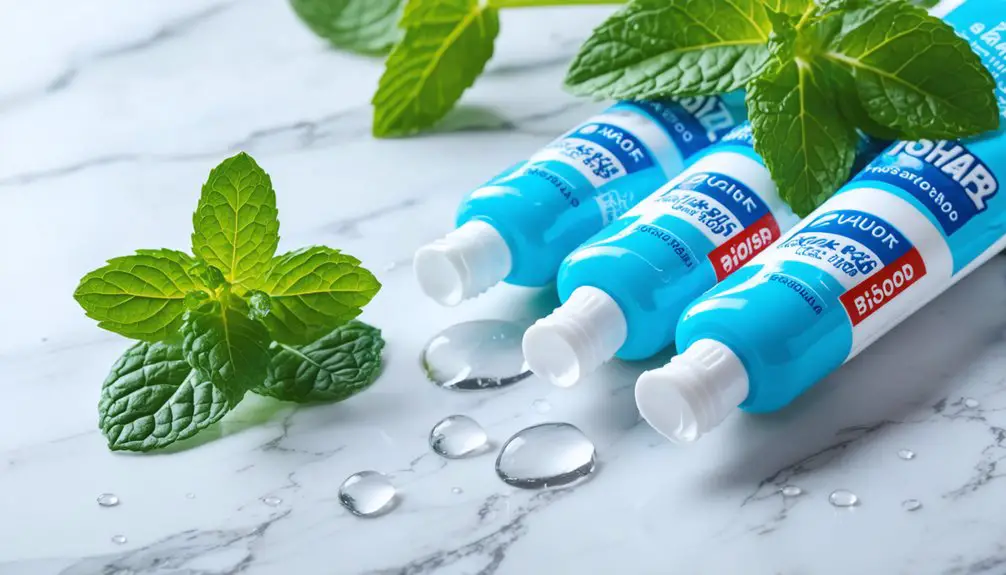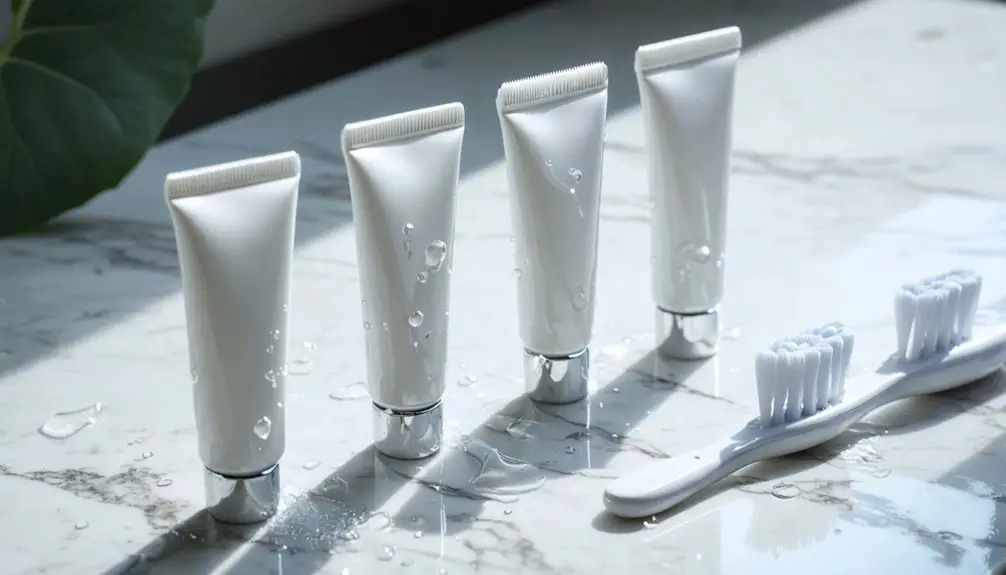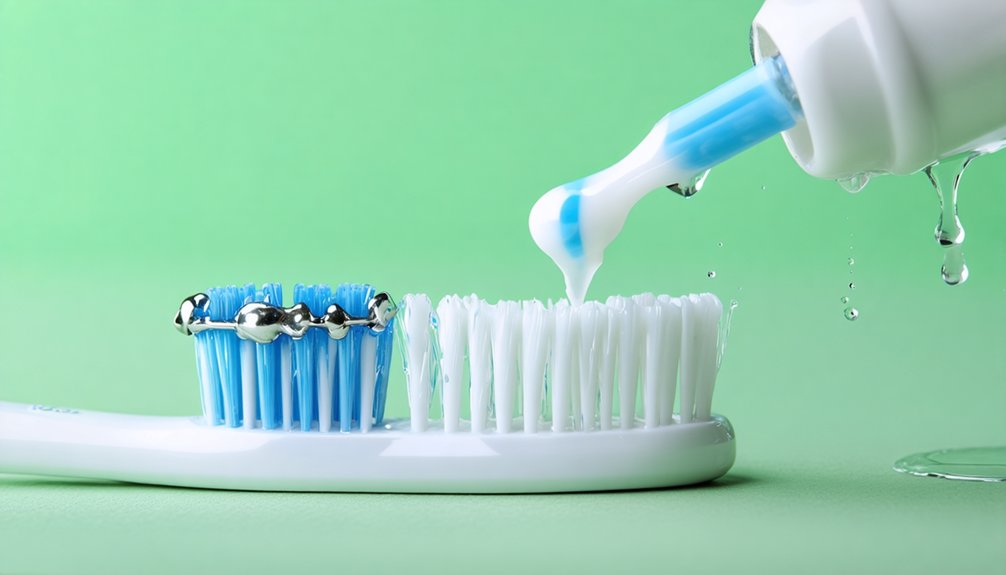You’ll find several effective artificial sweetener-free whitening toothpaste options from leading natural brands. Top choices include Georganics and PAIST, which use hydroxyapatite for remineralization, and Nelson Naturals, featuring activated charcoal in reusable glass packaging. These products combine plant-based ingredients like stevia extract, baking soda, and essential oils to naturally whiten teeth without harsh chemicals. The growing selection of clean-label formulations makes it easier to achieve a brighter smile while maintaining oral microbiome health.
Key Takeaways
- Georganics and PAIST offer zero-waste whitening toothpaste sweetened naturally with stevia rebaudiana extract instead of artificial sweeteners.
- Uncle Harry’s provides certified vegan whitening toothpaste free from artificial sweeteners while maintaining strict non-GMO standards.
- The Dirt specializes in organic whitening toothpaste that meets stringent natural standards without artificial sweetening agents.
- Nelson Naturals delivers whitening toothpaste in reusable glass jars, using natural ingredients like hydroxyapatite and baking soda for whitening.
- David’s Toothpaste combines natural whitening agents with sustainable packaging, avoiding artificial sweeteners and harmful synthetic additives.
Natural Whitening Ingredients That Replace Artificial Sweeteners
When seeking alternatives to artificial sweeteners in whitening toothpaste, several natural ingredients stand out for their ability to enhance both taste and oral health.
You’ll find hydroxyapatite, a naturally occurring mineral, leading the way in natural whitening effectiveness by remineralizing tooth enamel. Stevia rebaudiana extract offers a sweet taste while maintaining the product’s natural integrity.
For enhanced cleaning power, you can rely on ingredients like baking soda and silica, which effectively remove surface stains without harsh chemicals. Organic propolis extract provides natural antimicrobial properties that help protect against cavities and gum sensitivity. Natural salt acts as a powerful cleaning agent that helps maintain healthy gums.
Aloe vera complements these ingredients by providing soothing properties that support overall oral health.
These natural alternatives deliver comparable whitening results to conventional options while offering additional benefits such as reduced sensitivity and improved enamel strength.
Best Eco-Friendly Whitening Toothpaste Brands
You’ll find industry leaders like Georganics and PAIST offering zero-waste packaging solutions with recyclable metal tubes and compostable materials that minimize environmental impact.
Natural whitening ingredients such as nano-hydroxyapatite, activated charcoal, and mineral-rich clays provide effective alternatives to conventional chemical bleaching agents. Many eco-conscious brands, including Hello, use tea tree oil for its natural whitening and antibacterial properties. Brands like The Dirt focus on creating products that are healthy enough to eat while maintaining strict organic standards.
Brands like SuperBee, One Living Earth, and Uncle Harry’s demonstrate strong commitments to sustainable ingredient sourcing through their vegan, cruelty-free, and non-GMO certifications.
Zero-Waste Packaging Leaders
Leading the eco-conscious oral care movement, five standout brands have revolutionized whitening toothpaste packaging with their zero-waste initiatives.
Their sustainable materials and eco-friendly practices demonstrate a commitment to environmental stewardship while delivering effective whitening solutions.
The shift to zero waste oral care products helps combat the plastic pollution from billions of discarded traditional toothpaste tubes annually.
- Nelson Naturals champions reusable glass jars with metal lids, offering refills through zero-waste retailers.
- David’s Toothpaste utilizes fully recyclable aluminum tubes with metal roller keys and FSC-certified paper packaging.
- PAIST features infinitely recyclable aluminum tubes with zinc alloy caps.
- Etee delivers plastic-free tablets in glass jars with compostable refill packaging.
- Unpaste leads with fully biodegradable packaging made from paper and cornstarch using soy ink.
These innovative packaging solutions prove you don’t have to compromise environmental values for a brighter smile. This shift to eco-friendly packaging helps reduce the 1 billion toothpaste tubes that end up in landfills each year.
Natural Whitening Solutions Available
Natural whitening toothpastes have evolved remarkably, combining eco-friendly ingredients with proven stain-fighting capabilities.
You’ll find effective eco-friendly alternatives in brands like Davids, which offers 98% U.S.-sourced ingredients in recyclable metal tubes, and Dr. Bronner’s, featuring over 70% organic components with baking soda-based whitening. Risewell contains ethically sourced minerals from a mine in France for superior whitening effects.
For natural whitening without harsh chemicals, consider Hello’s plant-based formulas with aloe vera and coconut oil, or Wildist’s ethically sourced blends containing ginger and turmeric. Bite offers naturally whitening tablets that are TSA-friendly and completely plastic-free.
If you’re seeking zero-waste options, Butter Me Up provides organic activated charcoal toothpaste in glass jars.
These brands utilize gentle enzymatic action from papaya and pineapple extracts, alongside ingredients like hydroxyapatite and neem oil, to effectively remove stains while supporting overall oral health.
Sustainable Ingredient Sourcing Practices
Building on the evolution of natural whitening solutions, sustainable ingredient sourcing has become a defining feature of eco-conscious oral care brands. Through ethical partnerships and regional sourcing initiatives, these companies demonstrate their commitment to environmental stewardship while delivering effective whitening results.
- 98% of ingredients are locally sourced by leading U.S. manufacturers, greatly reducing transportation emissions.
- Supplier partnerships emphasize fair labor practices and eliminate modern slavery risks, particularly in Ayurvedic formulations.
- Premium natural ingredients like neem, bamboo, and Canadian glacial clay guarantee product purity.
- Plant-based, cruelty-free formulations exclude animal derivatives and harmful synthetics.
- Brands avoid artificial sweeteners, parabens, sulfates, and other chemicals that compromise human and environmental health.
Companies like David’s Toothpaste prioritize USA Origin ingredients to maintain quality standards and support domestic suppliers. Glass packaging with recyclable metal tubes ensures these products maintain plastic-free packaging throughout their lifecycle.
These sustainable sourcing practices create products that brighten your smile while protecting our planet’s resources.
Health Benefits of Switching to Sweetener-Free Options
Switching to sweetener-free whitening toothpaste supports your oral microbiome’s natural balance by eliminating artificial compounds that can feed harmful bacteria.
You’ll reduce your exposure to synthetic sweeteners and additives that may trigger allergic responses or sensitivities in the oral cavity.
Natural antibacterial ingredients like neem and tea tree oil effectively combat plaque-forming bacteria while maintaining gentle care for your teeth and gums.
Natural Microbiome Support
While artificial sweeteners have long been considered a safe alternative to sugar in dental products, emerging research reveals their potentially disruptive effects on the oral microbiome.
By choosing sweetener-free whitening toothpaste, you’ll support ideal microbial diversity and maintain better oral health.
Scientific evidence shows that sweetener-free options help:
- Preserve beneficial bacteria that naturally inhibit harmful pathogens
- Maintain balanced microbial communities essential for gum health
- Reduce inflammation risk by supporting microbiome homeostasis
- Prevent selective pressure that could favor destructive bacteria
- Support systemic health by avoiding microbiome disruption
Understanding these benefits can guide your choice in dental products.
When selecting a whitening toothpaste, look for formulations that protect your oral microbiome while achieving the aesthetic results you desire.
Reduced Allergic Response
For individuals with sensitivities, artificial sweeteners and common additives in conventional toothpaste can trigger a range of allergic responses, from oral mucosal irritation to systemic reactions.
By switching to sweetener-free options, you’ll reduce your exposure to known irritants like saccharin and aspartame while supporting better oral health.
Natural flavorings and allergy awareness are key considerations when choosing a whitening toothpaste.
Eliminating sodium lauryl sulfate (SLS) can greatly decrease oral ulcers and dry mouth symptoms.
You’ll also benefit from avoiding artificial preservatives and problematic flavoring agents like cinnamaldehyde, which can cause inflammation and stomatitis.
Many patients report immediate improvement in oral comfort and reduced allergic responses when changing to formulations free of these common irritants.
How Natural Toothpastes Achieve Whitening Results
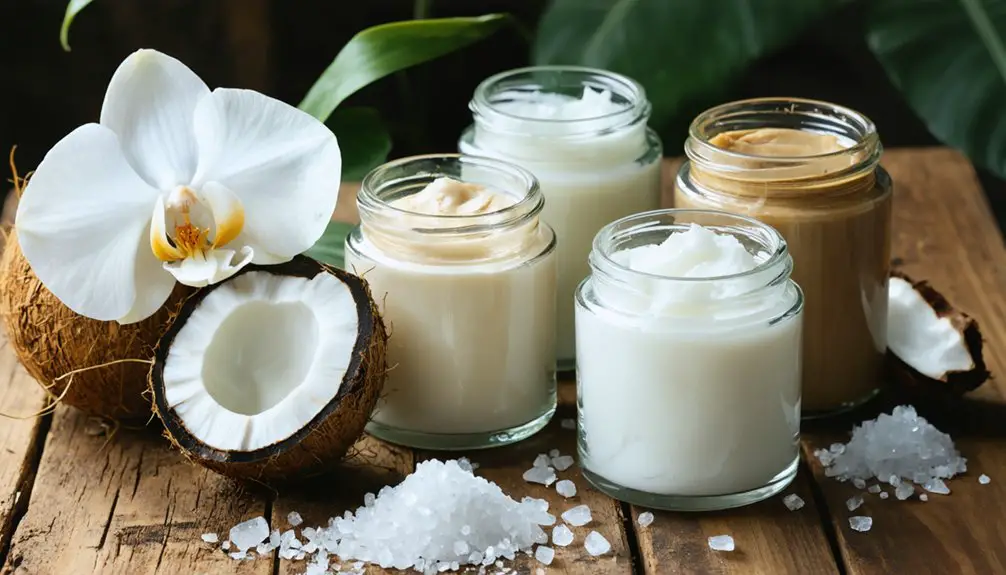
Natural toothpastes rely on several key ingredients to achieve their whitening effects without harsh chemicals.
Natural solutions harness the power of key ingredients to whiten teeth effectively, offering a gentler alternative to harsh chemical treatments.
These natural whitening techniques utilize specific compounds that work through different mechanisms to remove stains and brighten your smile. Understanding ingredient efficacy helps you make informed choices for your oral care routine.
- Calcium carbonate and bentonite clay act as gentle abrasives to lift surface stains.
- Activated charcoal provides stronger stain-binding properties than traditional ingredients.
- Baking soda offers mild abrasive action while helping neutralize acid.
- Plant-based enzymes break down protein-based stains at the molecular level.
- Essential oils contribute antibacterial properties while providing fresh breath.
While these natural alternatives may work more gradually than chemical whiteners, they’re generally safer for long-term use and less likely to cause tooth sensitivity or enamel damage.
Sustainability and Packaging Innovations in Natural Toothpastes
Sustainability initiatives in toothpaste packaging have sparked a revolution in eco-friendly oral care solutions.
You’ll find innovative sustainable packaging options ranging from monomaterial recyclable tubes made from high-density polyethylene to zero-waste alternatives like glass jars and metal tins. Major manufacturers are adapting to eco-friendly materials, with companies like Colgate committing to 100% recyclable tubes by 2025.
When choosing natural whitening toothpaste, you can now opt for products in biodegradable pouches or recyclable cardboard containers.
Toothpaste tablets represent a particularly promising development, eliminating traditional plastic tubes while simplifying transport and storage. Many brands are incorporating post-consumer recycled plastics and bioplastics made from sugarcane, supporting circular economy principles and reducing your environmental impact.
Key Certifications to Look for When Choosing Natural Whitening Products
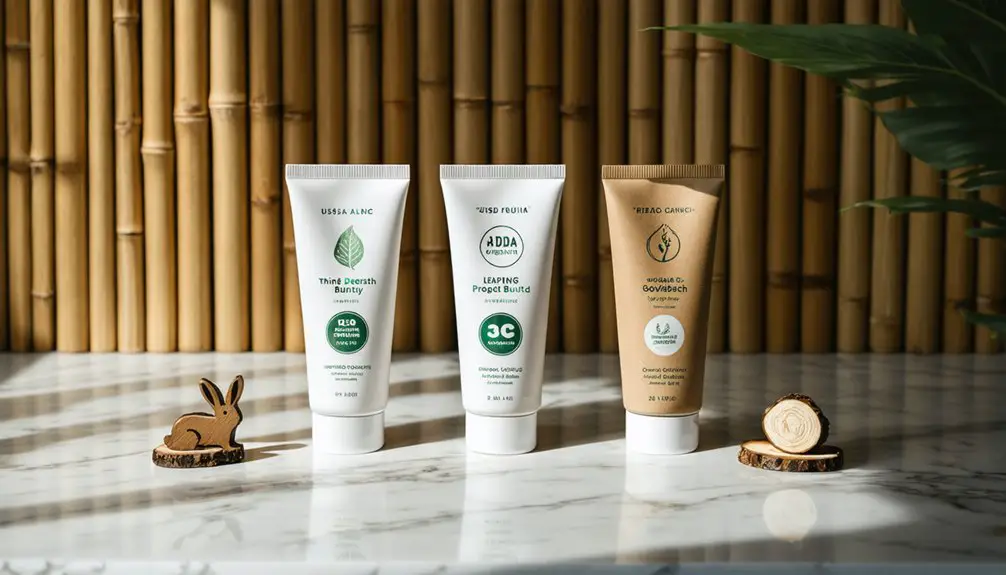
When selecting natural whitening toothpaste, you’ll need to understand key certifications that validate product claims and safety standards.
The certification importance extends beyond basic quality assurance to guarantee ingredient transparency and ethical manufacturing processes.
Look for these essential certifications:
- NPA Certified – Guarantees natural ingredients and full disclosure of components
- COSMOS ORGANIC – Verifies 95-100% natural origin ingredients with minimum 10% organic content
- EWG Verified – Confirms products are free from hazardous chemicals
- Leaping Bunny – Guarantees zero animal testing throughout development
- B Corp – Validates company commitment to environmental and social responsibility
These certifications help you make informed decisions about your natural whitening toothpaste while supporting manufacturers who prioritize safety, sustainability, and ethical practices.
Understanding Clean Label Ingredients in Whitening Formulas
Clean label ingredients in whitening toothpaste formulas have revolutionized the oral care industry by offering effective alternatives to synthetic chemicals.
You’ll find plant-derived ingredients like green tea and papaya leaf extracts that naturally combat stains while promoting oral hygiene. Natural ingredient benefits extend to mineral components such as hydroxyapatite and hydrated silica, which gently polish teeth without harsh abrasives.
Clean label transparency means you can easily identify natural sweeteners like stevia and xylitol, which replace artificial alternatives while providing therapeutic benefits.
Essential oils from peppermint and citrus deliver fresh breath and antimicrobial properties. For gentle cleansing, coconut-derived surfactants offer an effective alternative to harsh detergents, ensuring your teeth get clean while maintaining enamel integrity and gum health.
Frequently Asked Questions
How Long Does It Take to See Whitening Results With Natural Toothpaste?
Rome wasn’t built in a day, and you’ll need patience. With natural ingredients, you’ll typically see initial whitening results in 2-4 weeks, while significant whitening timeline improvements take 6-8 weeks of consistent use.
Can Natural Whitening Toothpaste Remove Deep-Set Coffee and Wine Stains?
Natural toothpaste alone won’t effectively remove deep-set coffee discoloration. While it may help with surface stains, you’ll need professional treatment or peroxide-based products for significant natural stain removal below the enamel.
Are Artificial Sweetener-Free Toothpastes Safe for Sensitive Teeth?
Yes, artificial sweetener-free toothpastes are safe and often better for sensitive teeth. Ingredient analysis shows they avoid irritants while containing proven sensitivity relief compounds like potassium nitrate and nano-hydroxyapatite.
Do Natural Whitening Toothpastes Have a Shorter Shelf Life?
While you’ll get excellent whitening results, natural ingredients do reduce shelf stability. You’ll find your natural whitening toothpaste lasts 12-18 months, compared to 2-3 years for conventional options.
How Often Should I Brush With Natural Whitening Toothpaste for Best Results?
You should brush twice daily with natural whitening toothpaste, being mindful that certain natural ingredients like charcoal or baking soda need limited use to protect your enamel while achieving ideal results.
References
- https://orbasics.com/blogs/stories/non-toxic-toothpaste-brands-for-a-fresh-and-healthy-smile
- https://www.healthline.com/health/dental-and-oral-health/natural-organic-toothpastes
- https://www.greenhive.io/blog/zero-waste-and-eco-friendly-toothpaste-brands
- https://www.tomsofmaine.com/products/fluoride-free-antiplaque-whitening-peppermint-toothpaste
- https://www.target.com/c/toothpaste-oral-care-personal/no-artificial-sweeteners/-/N-5xtzsZ9hbmel1yzly
- https://www.mouthwatchers.com/products/toothpaste
- https://www.womenshealthmag.com/beauty/g26031480/best-natural-toothpastes/
- https://beforecompany.com/products/whitening
- https://www.cnet.com/health/personal-care/best-whitening-toothpaste/
- https://wellnesse.com/products/toothpaste
